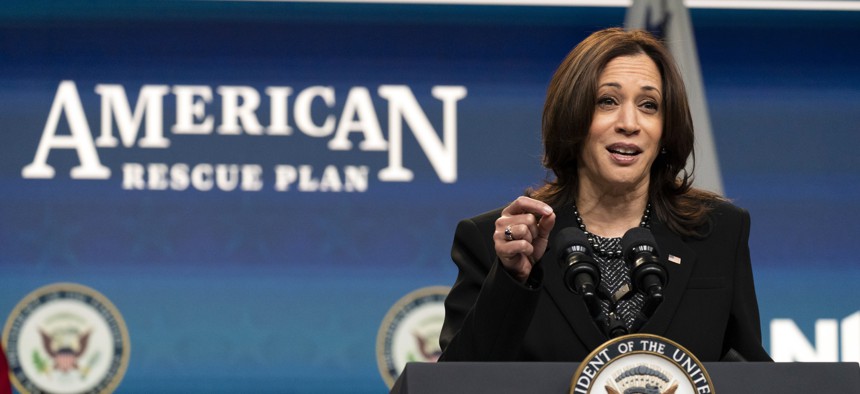Additional State and Local Perks Make it Into Senate Covid Relief Bill

Vice President Kamala Harris speaks virtually to the National League of Cities' Congressional City Conference from the South Court Auditorium in the Eisenhower Executive Office Building on the White House campus, Monday, March 8, 2021, in Washington. AP Photo/Alex Brandon
Extra money for counties with untaxable public land and provisions that allow localities to spend federal dollars on hazard pay for workers are included in the version approved over the weekend.
The coronavirus response bill approved by the Senate provides assistance to state and local governments beyond $350 billion in direct aid.
Amendments to the bill will also provide more money to counties with large swaths of federal land that is not subject to property taxes and would allow state and local governments to spend direct aid on extra pay for employees responding to the pandemic.
The bill advanced in the Senate over the weekend and is now set for a final vote in the House this week before it heads to President Biden’s desk.
One new provision in the legislation would provide $1.5 billion over two years for counties with untaxable public lands. The Treasury Department would develop a distribution formula for the program that would allocate money based on the eligible county’s economic conditions, according to Sen. Ron Wyden, the Oregon Democrat who sponsored the proposal.
Almost 62% of counties have some federal land within their borders and county officials have lobbied Congress in the past for additional funding through public lands-related payment programs, such as Payments in Lieu of Taxes, which compensate jurisdictions for their nontaxable federal land. In fiscal 2020, 1,900 local governments received $514.7 million in PILT funding.
County officials praised the public land provision in the Senate bill, saying it would provide rural counties with a needed boost during the pandemic.
“Federal lands counties rely on natural resource extraction, such as timber and petroleum, as a key component of our local economies,” said Joel Bousman, the commissioner of Sublette County, Wyoming and a member of the National Association of Counties. “The Covid-19 pandemic has cost us jobs in these sectors and negatively impacted communities like mine.”
The $1.9 trillion relief bill will allocate $350 billion in direct aid to state and local governments. The original Senate package included some restrictions on state and local government funding, requiring jurisdictions to use the money for certain purposes, like providing aid to local households or for investment in certain types of infrastructure.
The adopted version would broaden those eligible spending categories to also allow states and localities to pay certain employees “premium pay” of up to $13 an hour in addition to their regular salary for work performed during the public health emergency. It was unclear from the legislation which government workers would be considered eligible for this additional pay. But under the bill, no single worker could receive more than $25,000 under this provision.
Many state and local governments offered hazard pay to frontline workers at the outset of the pandemic. Some limited the payments to one-time bonuses. But others that continued to offer hazard pay began to question whether they could afford the expense as the pandemic dragged on.
If authorized in the final legislation, Vince Williams, the mayor of Union City, Georgia said he’d make it a priority to provide that type of assistance to city workers.
“If the federal aid gives us the flexibility to do it, we owe it to those frontline workers,” said Williams, the first vice president of the National League of Cities, as he spoke at the organization’s congressional conference on Monday.
Victoria Woodards, the mayor of Tacoma, Washington, said she would want to make sure the city’s basic services were restored before looking into using federal covid relief funds for hazard pay.
A spokesman for the National Association of Counties said the funding would ensure that essential workers “receive the support they deserve.”
Vice President Kamala Harris touted the progress the Biden administration has made increasing the production and distribution of Covid-19 vaccines as she addressed the National League of Cities on Monday, but said the aid bill is necessary to “help us beat this virus.”
Harris also stressed the importance of equity in local responses to the pandemic and announced a grant program separate from the covid relief package that would offer $250 million to localities to promote health literacy.
“Our goal is to provide underserved communities with the information they need to stay safe and get vaccinated,” Harris said, adding that the program is intended to fund 30 urban and 43 rural projects.
“Please do work with us to put equity at the center of our collective response and to identify those individuals and communities that have been overlooked,” she added in her remarks to the city officials.
Andrea Noble is a staff correspondent with Route Fifty.
NEXT STORY: Economists: Biden’s $1,400 Covid-19 Checks May be Great Politics, but it’s Questionable Economics





